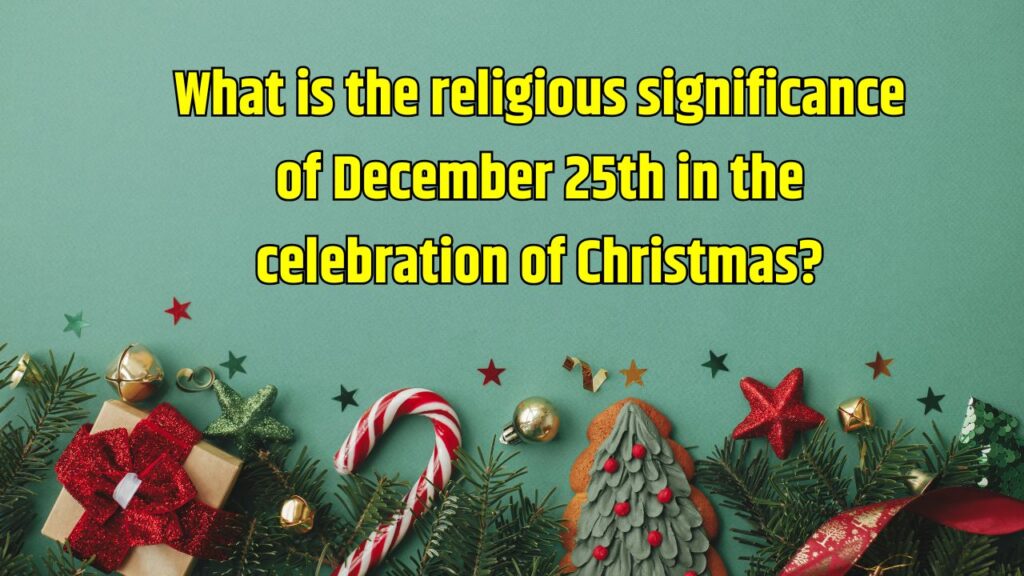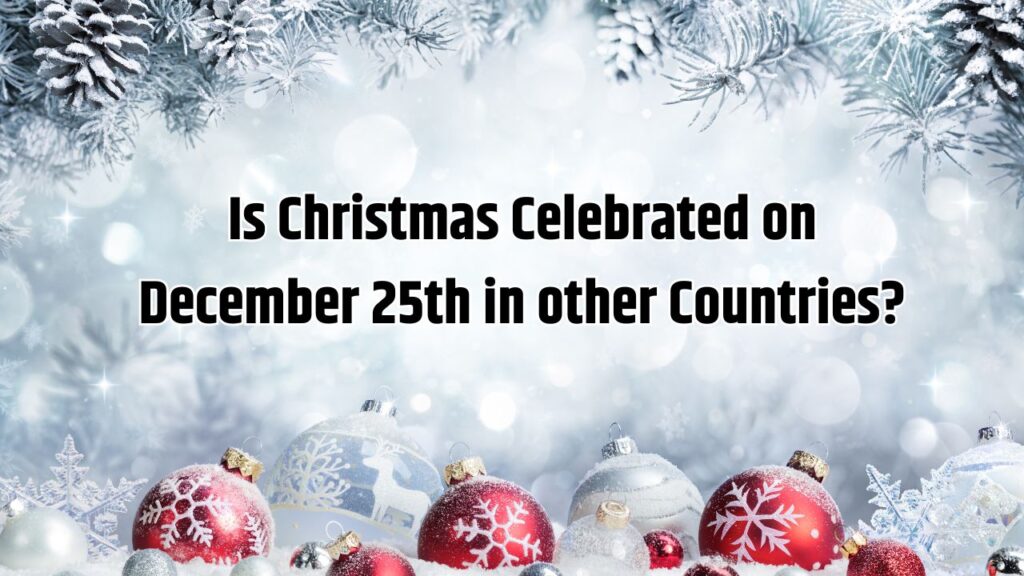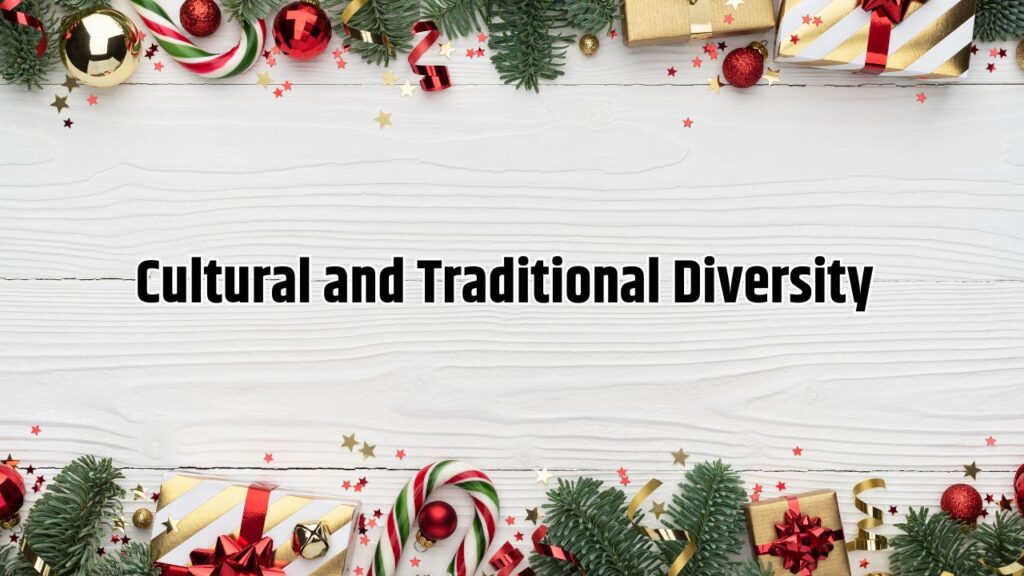Why is Christmas Celebrated on December 25th? Every year on December 25, people celebrate Christmas, one of the most well-known holidays in the world. However, why was this day selected? How is it observed in many civilizations, and what are its historical, religious, and cultural significance? This article goes into great length about these questions.

Contents
- Why was December 25 chosen as the date to celebrate Christmas?
- What is the religious significance of December 25th in the celebration of Christmas?
- Is Christmas Celebrated on December 25th in other Countries?
- 1. December 25: Western Christianity
- 2. January 7: Eastern Orthodox Christianity
- 3. January 6: Armenian Church
- 4. January 7: Ethiopia and Eritrea
Why was December 25 chosen as the date to celebrate Christmas?

December 25 was chosen to celebrate Christmas not because it’s the actual birthdate of Jesus Christ (the Bible doesn’t specify the exact date), but for several cultural, political, and theological reasons:
Pagan Traditions:
December 25 aligns with pre-existing pagan celebrations like Saturnalia and the birthday of Sol Invictus (the Unconquered Sun). These festivals featured feasting, gift-giving, and merriment. Early Christians adopted this date to make the celebration of Jesus’ birth more relatable and acceptable to pagan converts by integrating familiar customs.
Political and Religious Strategy:
In 336 CE, during Emperor Constantine’s rule (the first Christian Roman Emperor), December 25 was officially recognized as Christmas. This was part of a larger effort to unify the Roman Empire under Christianity and embed the faith into Roman culture.
Theological Symbolism:
Some theologians argue December 25 was chosen due to its connection to March 25, which was celebrated as the date of Jesus’ conception (spring equinox). Counting nine months from March 25 leads to December 25. Additionally, this date is close to the winter solstice, symbolizing Jesus as the “Light of the World” as days begin to grow longer.
These combined factors made December 25 a meaningful and strategic choice for celebrating Christmas.
What is the religious significance of December 25th in the celebration of Christmas?

The significance of December 25 extends beyond historical reasons. It holds deep religious meaning for Christians.
1. Commemorating Jesus’ Birth
This day celebrates the birth of Jesus Christ, considered the Son of God and Savior of humanity in Christianity. Christmas symbolizes not just a festival but also the core Christian values of love, compassion, and forgiveness.
2. Religious Rituals and Traditions
Christmas is marked by various religious services, with Midnight Mass being particularly significant. This service represents the birth of Jesus and conveys messages of hope, renewal, and salvation.
3. Spiritual Reflection and Renewal
Christmas offers Christians an opportunity for spiritual reflection and renewal. It emphasizes the importance of love, peace, and harmony.
Is Christmas Celebrated on December 25th in other Countries?

Christmas is celebrated on different dates in various countries, depending on cultural and denominational traditions. Here’s how:
1. December 25: Western Christianity
Most Catholics and Protestants worldwide, including countries like the United States, Canada, and much of Europe, celebrate Christmas on December 25. This date is recognized as the official day of Jesus Christ’s birth in Western Christian traditions.
2. January 7: Eastern Orthodox Christianity
In countries like Russia, Greece, and parts of Eastern Europe, Orthodox Christians celebrate Christmas on January 7. This is due to their continued use of the Julian calendar, which is 13 days behind the Gregorian calendar.
3. January 6: Armenian Church
The Armenian Apostolic Church observes Christmas on January 6. This combines the celebration of Jesus’ birth and baptism into a single day, aligning with their unique traditions.
4. January 7: Ethiopia and Eritrea
In Ethiopia and Eritrea, Christmas, known as Gena, is celebrated on January 7. The focus here is more on religious rituals and cultural customs than commercial festivities.
Therefore, while December 25 is the most common date for celebrating Christmas globally, some countries and Christian communities celebrate it on alternative dates due to historical, religious and cultural differences.
Cultural and Traditional Diversity

Christmas is celebrated in various ways across the globe, reflecting rich cultural and traditional diversity.
1. United States
In the U.S., Christmas blends religious and secular traditions. Activities like decorating Christmas trees, exchanging gifts, and attending church services are common.
In Scandinavian countries like Sweden, Denmark, and Norway, traditions include Saint Lucia’s Day, dancing around Christmas trees, and enjoying traditional foods.
3. Australia
In Australia, Christmas occurs during summer, so people often celebrate with barbecues and beach outings.
4. China
In China, Christmas is celebrated as a commercial festival, with the tradition of gifting “peace apples” gaining popularity.
Conclusion
The tradition of celebrating Christmas on December 25 is the result of historical, religious, and cultural influences. This date not only symbolizes the birth of Jesus Christ but also conveys messages of love, peace, and community unity. Whether celebrated on December 25 or other dates, Christmas embodies the richness of human culture and shared joy.